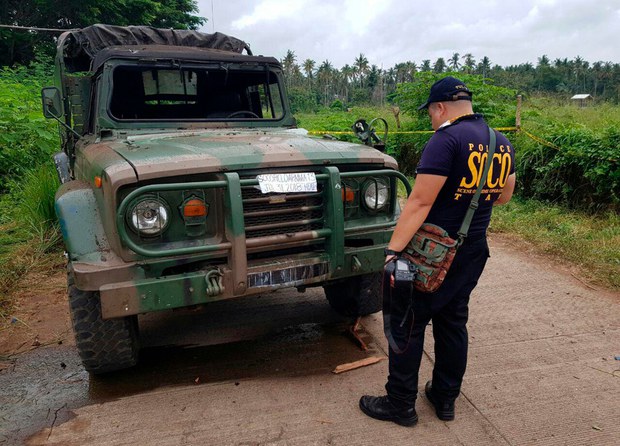Militants Wanted for Southern Philippine Bombings Elude Arrest
2018.09.04
Isulan, Philippines
 A Philippine police investigator inspects a vehicle at a military checkpoint near where a bomb exploded in the southern Philippine town of Lamitan in Basilan province amid threats of bombings, July 31, 2018.
A Philippine police investigator inspects a vehicle at a military checkpoint near where a bomb exploded in the southern Philippine town of Lamitan in Basilan province amid threats of bombings, July 31, 2018.
Islamic State-linked fighters blamed for two deadly bombings in a southern Philippine province during the past week have managed to slip past a government dragnet in vast marshlands in the south, the military said Tuesday.
Regional military spokesman Capt. Arvin John Encinas told BenarNews that at least 100 fully armed members of Bangsamoro Islamic Freedom Fighters (BIFF) under the command of Abu Turaife had been initially trapped in parts of Liguasan Marsh. However, many of them escaped undetected.
“We are looking into more than 100 armed militants in the marshland but some of them managed to escape our security cordon recently,” Encinas said.
The military and police have tagged the BIFF as the primary suspect behind the two bomb attacks that killed at least five, and wounded scores of others, in the southern town of Isulan. Weeks earlier, IS had claimed a suicide bomb attack that left 11 people dead on Basilan island, farther to the south.
The BIFF is an extremist group that split from the Moro Islamic Liberation Front (MILF), once the country’s largest Muslim rebel force, which signed a peace pact four years ago.
On July 26, President Rodrigo Duterte signed a law promising wider self-rule for Muslims in the south.
The law will give the MILF control over many local government functions, including taxation and education, as well as allow Muslim Filipinos to incorporate Islamic law into their justice system. The MILF will retain control of the autonomous region until elections are held later this year.
The BIFF, however, has rejected the deal and vowed to continue its fight for self-rule in the south, where Muslims are a large minority.
One of its commanders, Turaife, has been touted as the likely next leader of the local IS branch in the south, after Isnilon Hapilon was killed by the military in Marawi last year. Hapilon’s death in October effectively ended the Marawi siege that killed 1,200 people, most of them militants.
While the BIFF as an organization did not send fighters in Marawi, it had launched diversionary attacks elsewhere in the south.
Encinas said that the United States was helping Filipino forces flush out the BIFF from their known lairs in the south. Primarily, he said, Washington was providing them with vital intelligence data against the BIFF, similar to what they did in assisting Filipino forces in Marawi.
“They are providing us intelligence reports. Our coordination is only limited to sharing of information,” Encinas said of the U.S. assistance.
Earlier, Washington had assured the Philippines of its continuing support on its war on terror amid the deadly bomb attacks in Mindanao.
Both allies are bound by a 1951 Mutual Defense Treaty, under which they can call on each other for help in times of crises or aggression by outside forces. While U.S. troops are barred from joining actual combat operations in the Philippines, they have been providing training and hardware upgrades since the 1990s.
Brig. Gen. Cirilito Sobejana, the joint task force military commander in the south, said troops had added security to Isulan and other cities in the south.
“The barbaric attacks were part of the retaliation of the bandits since they suffered heavy losses from our sustained military operation,” Sobejana said Tuesday, referring to the Isulan bombings.
“Those bandits are now lacking on logistics and financial support, so they engage in more terror attacks and wanted to project that they are still capable to sow terror and acquire financial support from the international terror group,” he said.
Richel V. Umel from Iligan and Froilan Gallardo from Cagayan de Oro contributed to this report.







